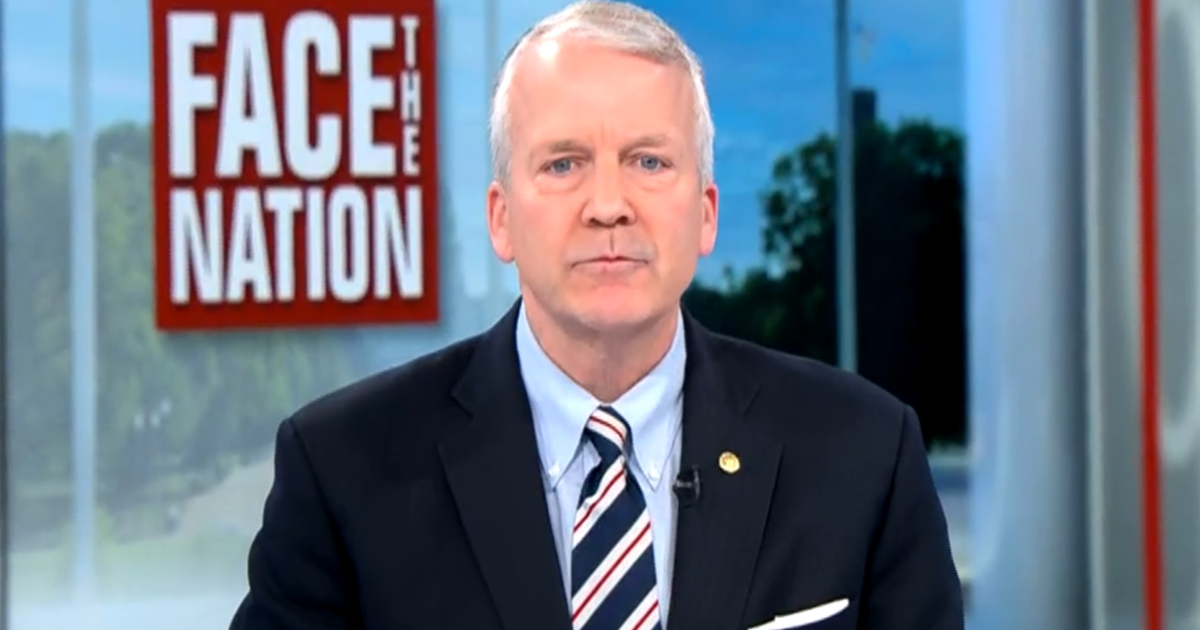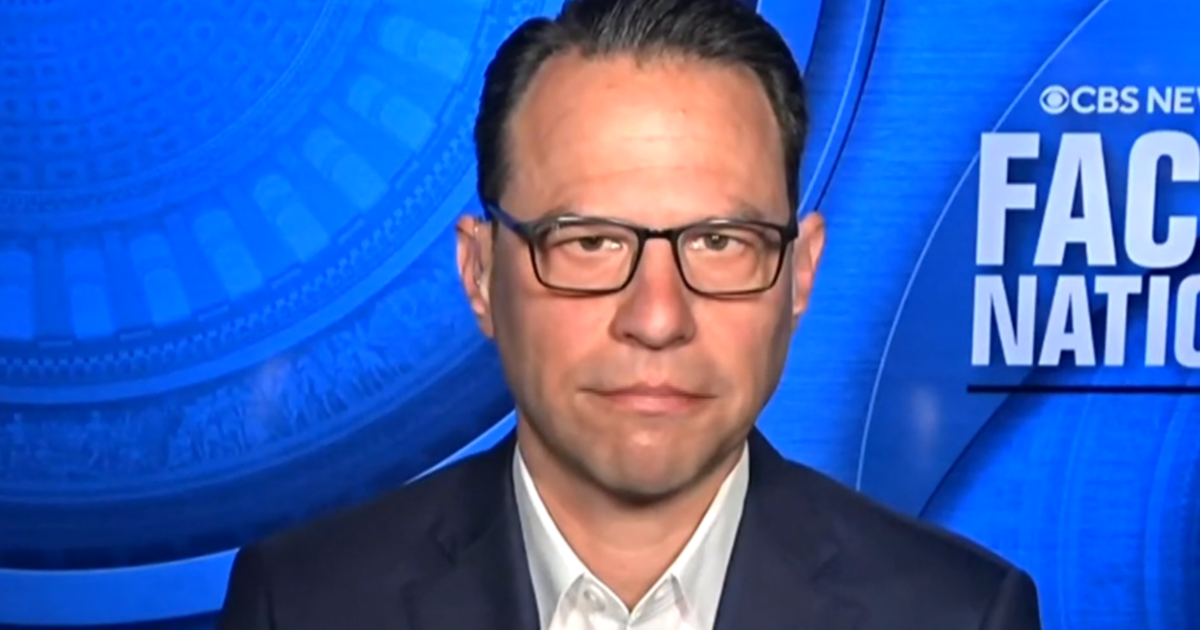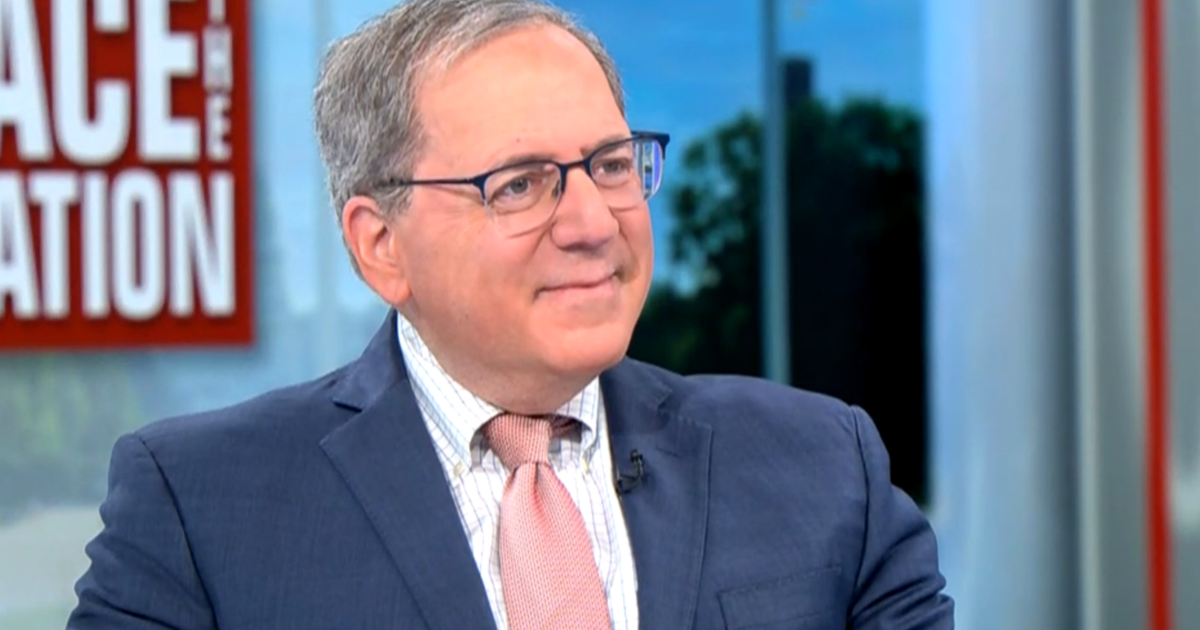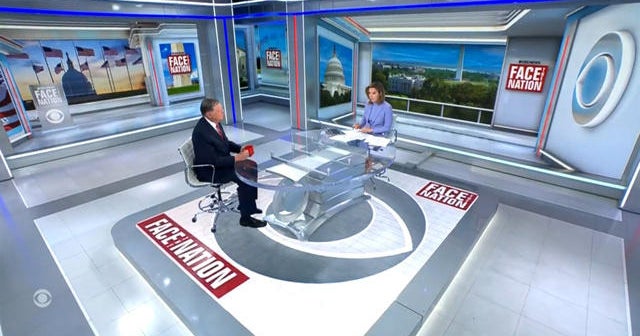Allies over the pond press ahead for COVID vaccine as U.S. grapples with protests
As attention in the U.S. is stretched from a pandemic and economic crisis, to now nationwide protests, world leaders continue to shore up efforts to develop a vaccine for COVID-19. The global race for immunization has seen countries scrambling to secure stakes in the most promising vaccines and drugs.
More than a hundred vaccines are in development, with 10 in clinical trials: 5 from China, 4 in the US, and one in the UK, according to the World Health Organization (WHO).
"We've been watching the protests, I think some of what we've seen has been alarming," UK Ambassador to the U.S. Karen Pierce told "Face the Nation" moderator Margaret Brennan. "I think there is a sense that the COVID pandemic is making tensions worse, particularly when one thinks of economic hardships, and also the striking racial disparities that are arising out of the crisis outcomes."
The U.S. has heavily invested in promising Europe-based vaccine programs as well as its own, including $1.2bn to obtain 300 million—or a third of the first billion doses of the UK's promising vaccine being developed by British-Swedish company AstraZeneca and the University of Oxford.
U.S. investment in a vaccine being developed by French company Sanofi also saw President Macron summon its chief executive last month for saying America has the right to the largest pre-order for being its biggest donor.
Asked whether the U.S. would come to an agreement with the UK on how to prioritize who gets a vaccine first, Ambassador Pierce said "I'm not sure exactly what the mechanism will be"; she added "Our understanding that everybody involved in the vaccines is very keen to see them produced at a scale that will ensure that every country who needs them gets them."
Asked if the Trump Administration pulling the U.S. out of the WHO will impact global efforts for a vaccine, Pierce said, "The United States has said that it will still contribute the same amount of funding to the global health system as it gave to the WHO. So we await to see more details of that."
The COVID-19 pandemic is also significantly disrupting other global immunization programs. U.N. agencies and the GAVI international vaccines alliance have said that 80 million children under the age of one in at least 68 countries are now at even greater risk of diphtheria, measles and polio because routine immunization efforts have been thrown into disarray by travel restrictions, delivery delays, and parents' fear of leaving home. The UK will be hosting a virtual summit for GAVI on Thursday to raise $7.4 billion.
"Of that 7.4 billion, one billion is coming from the United States," Pierce said. The alliance needs the funds to immunize an additional 300 million children from other life-threatening diseases over the next 5 years. "It's a fast delivery arm of the global health system, so that vaccines get to people quickly," Pierce explained.
The U.S. notably did not participate in another vaccines summit on May 4 that saw other world leaders pledge more than $8 billion specifically towards the development of COVID-19 vaccines and treatments. Prime Minister Boris Johnson has invited the President Trump to participate in Thursday's GAVI summit, and Ambassador Pierce told Brennan that the UK hopes the U.S. leader will record a video for it and that other U.S. officials will participate.
White House officials have told CBS News that a lot of the diplomacy relating to a COVID vaccine will be happening through the G7 world powers, of which the U.S.-hosted June summit has been postponed to the fall. Despite this, Pierce said that foreign ministers and officials will continue to meet under the G7 and work behind the scenes.
Global cooperation in battling the coronavirus also continues to be overshadowed by tensions between Washington and Beijing, now exacerbated by China's imposition of its national security law upon Hong Kong, also prompting grave concern from the UK.
Asked whether this is complicating the world's reliance on China for PPE, Pierce said "We want to prioritize international cooperation to overcome the pandemic and get us on the road to recovery, and then address some of the underlying issues."
On China's vaccine efforts, Pierce added "China does have a very large production capability, as you'd expect. I just note that not all the equipment that comes out of China is up to the standards that Western countries, other countries might expect."
The following is a transcript of an interview with UK Ambassador Karen Pierce with "Face the Nation" moderator Margaret Brennan:
MARGARET BRENNAN: Ambassador Karen Pierce is the United Kingdom's representative here in the nation's capital. Before that, she was ambassador at the United Nations. And she joins us this morning. Ambassador, thank you for joining us.
UK AMBASSADOR KAREN PIERCE: Thank you very much for having me, Margaret.
MARGARET BRENNAN: So part of your job is to explain to London what is going on in the United States, both with the American people and the U.S. government. Given the economic, medical crisis, now the violence in the streets, the racial strife, I wonder, how do you explain this back home?
AMBASSADOR PIERCE: There's huge interest in what happens in America at all times in the U.K. and, as you suggest, particularly at the moment. I like to think of myself as a friend of America, this is the fourth time I've served here, and I'm saddened by what we're seeing on the pictures and what's happening, but also the underlying issues. There have been protests also in the U.K. The issue of racial inequality is one that we all need to tackle. We've been watching the protests, I think some of what we've seen as being alarming, if I may say so. We're also very keen that people should be able to protest peacefully. That's a very important part of a free society. At the moment, we're just reporting back to London on what's happening. I think there is a sense that the COVID pandemic is making tensions worse, particularly when one thinks of economic hardships, and also the striking racial disparities that are arising out of the crisis outcomes.
MARGARET BRENNAN:The UK will be hosting this Thursday, a summit on vaccines, and I know your prime minister invited President Trump. Will the US be participating?
AMBASSADOR PIERCE: We very much hope so. As you say, the prime minister spoke to the president last week. We hope the president might be able to record a video for the conference, and then other US officials, I think in particular the acting head of USAID, will be taking part. And the US has very generously donated one billion dollars to the global vaccine cause. We're looking in this -- it's a five year period, and the aim of the summit is to raise 7.4 billion dollars, which is called replenishment. It's the amount GAVI needs so it can carry out vaccinations of around 300 million people for the next five years. And if that 7.4 billion, one billion is coming from the United States.
MARGARET BRENNAN: And GAVI is what is, what you're using, you refer to, is this global vaccines initiative.
AMBASSADOR PIERCE: Yes—it's an alliance. It was put together to have a number of organizations like WHO and UNICEF. It has a number of donor countries. The US is one. Norway's another country that's made a very big donation. And, if you like, it's a fast delivery arm of the global health system so that vaccines get to people quickly. And, in particular, it does a lot of fantastic work with children. As the UK, we've just given three hundred million pounds, so over 400 million dollars, and that's primarily to try and vaccinate 75 million children. So it does great work. It's a real success story, I think, of the international community.
MARGARET BRENNAN: And this is not just about COVID-19 and the potential of a vaccine, this is also other types. Does the US pulling out of the World Health Organization impact these initiatives?
AMBASSADOR PIERCE: GAVI tends to deal with long running diseases, like typhoid. The COVID-19 vaccines are on the whole being developed through other mechanisms, as you say, through the WHO, but also elsewhere. There's a big effort going on to make sure that the vaccines and diagnostics will be available to developing countries, in fact, to all countries who need them, regardless of whether they invent them or produce them. The United States has said that it will still contribute the same amount of funding to the global health system as it gave to WHO. So we await to see more details of that.
MARGARET BRENNAN: One of the things that we have been told by White House officials is that the the diplomacy as it relates to a covid vaccine, a lot of that will be happening through the G7—through the biggest economies who have been in alliance through the G7 up to this point. Since that summit is no longer on the schedule for this month, and we don't know if it will be pushed off to the fall or not, do you see complications to some of the vaccine diplomacy among these global powers?
AMBASSADOR PIERCE: I don't think so, to be honest, because different ministers from different disciplines still meet under G7, and officials are still working together. So, Dominic Raab, who is the British Foreign Secretary, he put forward a plan at the start of the crisis around developing vaccines, helping resilience in developing countries, and helping the UN contribute to that. And then there were other strands about keeping global trade routes open, and getting British nationals and other nationals home. And those strands have more or less formed the bedrock of the G7 work in this area, and that continues between officials, particularly health officials of all the countries concerned. So, while it would be nice to have leaders come together and put the seal on that, the work is going on behind the scenes.
MARGARET BRENNAN: There are over 100 different vaccines in development all across the world. One of them that has gotten a lot of attention is being developed in the UK—the Oxford vaccine that now--they have partnered with AstraZeneca to produce it. And we know U.S. taxpayers have provided quite a lot of funding to the potential of buying 300 million doses of it. But I wonder, if the UK gets a vaccine first, who gets that first shot in the arm? How is that being figured out?
AMBASSADOR PIERCE: That's a very good question, and, you know, lots of countries were very interested in that answer. This is what the summit on the 4th of May that the U.K. held with the European Union, France and Germany, was particularly looking at. Because you've got the problem first of all of developing a vaccine that works, and then you've got the problem of having to produce it at scale so we can get it distributed, and that in itself is an additional step that may be quite difficult. So officials and ministers are coming together to try and work out the answers to those questions. It is possible, but only possible, that one might want to start with health workers in a range of countries, and then broaden out. Countries, governments will need to work out what is the best way of accessing the vaccine for their own workers and their populations. But there's now much more of a coordinated global effort to get the answers to those questions.
MARGARET BRENNAN: So the US didn't participate in that May summit. But is it your understanding that the US will come to an agreement with the UK on how to prioritize who gets it first?
AMBASSADOR PIERCE: I'm not sure exactly what the mechanism will be for that, to be honest. But it is our understanding that everybody involved in the vaccines is very keen to see them produced at a scale that will ensure that every country who needs them gets them.
MARGARET BRENNAN: Many poorer countries, particularly those in Africa, have pushed for any kind of vaccine to be patent free, or to pool the patent so that there would be easier, cheaper access around the world. Where is the UK on that, because the US hasn't clearly said it supports it. Does the UK support that idea?
AMBASSADOR PIERCE: We are part of an initiative called ACT - 'Act' - which is trying to find the best way to get these vaccines produced at scale and delivered right the way round the world where they're needed. It's implicit, in that we will have to sort out the patent issue. Whether that's by making things patent free, or whether it's by some other means, hasn't yet, to the best of my knowledge, been decided. But it is one of the questions we will need to look very closely at.
MARGARET BRENNAN: If a US company discovers a vaccine and is able to manufacture it and is the first to have something that's usable, is the UK confident that your nationals would have access to it, and quickly?
AMBASSADOR PIERCE: I don't want to say in absence of there actually being a vaccine, and the circumstances that might come with that. But we are certainly working very closely with all of our international partners in Europe, around the world, with U.S., to try and get safe, credible vaccines developed quickly, and got to everyone who needs them.
MARGARET BRENNAN: Do you see this as the prime focus, though, for world leaders to have a reason to get together in the fall?
AMBASSADOR PIERCE: The particular thing about G7 is that it's the world's major industrialized nations. So they bring a certain weight and input to the global economy. And as we all come out of the covid pandemic, I think one of the really important themes will be global confidence in world economic recovery, and the second important theme will be what our prime minister, Boris Johnson, calls 'building back better'—how do we make sure that the economic recovery is sustainable and is green, that it actually contributes to progress in some important areas. So I think that will be a very important theme of the G7 leaders whenever they get together.
MARGARET BRENNAN: Do you think Russia needs to be there as well, as President Trump has said he wants to invite them?
AMBASSADOR PIERCE: The G7, as I said, is made up of seven industrialised nations. The European Union is there. But it's always open to the presidency of each G7 to invite other countries to participate on certain themes, and you've seen that. It's a different question if you want to expand the membership of G7. For that, you actually need all the members to agree, and not allo members do agree that Russia should be included in G7, and that primarily goes back to Russian annexation of Crimea. But in terms of inviting other countries to individual sessions, that's been a longstanding practice and, on the whole, it works well.
MARGARET BRENNAN:One of the backdrops for when the moment we are in is this growing international tension between the United States and China, the world's two largest economies. The covid outbreak has added to that. And then we had this recent action related to Hong Kong that has led the Trump Administration to take some actions. I wonder what the UK view is on that—should more action be taken as it relates to Hong Kong, or should the focus be on lowering tension?
AMBASSADOR PIERCE: We're very concerned at the Chinese national security law. We look to the Chinese to change their approach. We urge them to abide by the Sino-British joint declaration that sets out Hong Kong status—that has the force of an international agreement. We're looking at British people in Hong Kong who hold a certain type of British passport, and looking to see whether we can extend their access to Britain. So we follow this with great concern. We also raised it along with the US and Germany at the Security Council in New York recently. I'm sure that when the G7 gets together, if the situation in Hong Kong has not improved, I'm sure that's something the G7 will look at. And I think, along with looking at the global economic recovery, G7 will want to urge all countries to play by the international rules. And that, I think, is a particular concern with China, as we've seen over the virus and over certain trading and security practices.
MARGARET BRENNAN: Given how reliant the world is on China's production of protective gear and then the potential that China could get a vaccine first. Does it make that more complicated?
AMBASSADOR PIERCE: I think there's a very important aspect here of international cooperation. From the British perspective, we want to prioritize international cooperation to overcome the pandemic and get us on the road to recovery, and then address some of the underlying issues that I just mentioned. So, we would certainly give priority to that. China does have a very large production capability, as you'd expect. I just note that not all the equipment that comes out of China is up to the standards that Western countries, other countries might expect, so that will be a factor. But I think the important thing at the moment will be to have as much international cooperation around dealing with pandemic as possible, and then address some of these other issues.
MARGARET BRENNAN: Understood, Ambassador Pierce, thank you very much for your time this morning.
AMBASSADOR PIERCE: Thank you very much for having me.



